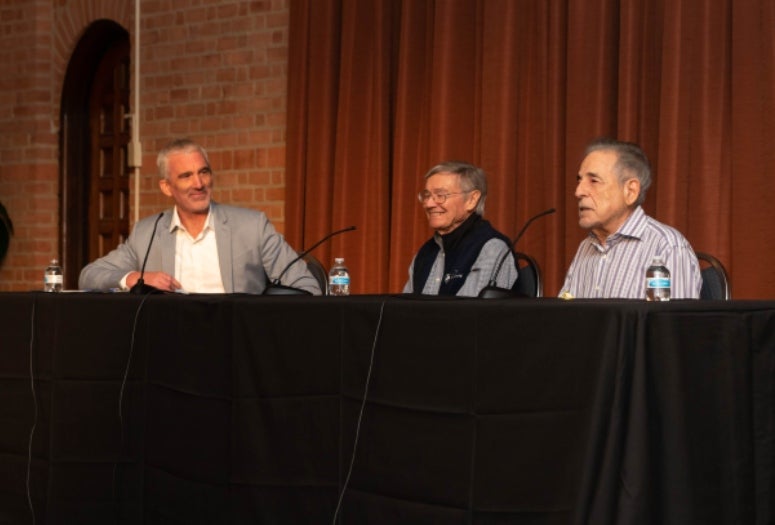Voicemail is something we take for granted today, but decades ago, a company founded by a few Rice alumni helped make it possible.
Somebody had to figure out how to digitize phone messages. That turned out to be a task for which ROLM Corp. was perfectly suited, and it helped put a relatively small technology company in a position to challenge the telecommunications status quo.
“There are little niches that you can get started in, and they eventually turn into big niches,” said Robert Maxfield ’63 ’64. “You can disrupt a whole industry.”
That’s one of the lessons imparted by a couple of legendary Rice alums welcomed back to campus last week by Dean Luay Nahkleh, The George R. Brown School of Engineering, the Department of Electrical and Computer Engineering and the Liu Idea Lab for Innovation and Entrepreneurship. At “Pioneers of Innovation: A Fireside Chat,” Maxfield and Walter Loewenstern ’58 ’59 engaged in a discussion moderated by Edward Knightly, the Sheafor-Lindsay Professor of Electrical and Computer Engineering and a professor of computer science. The Oct. 19 talk at the Grand Hall in the Rice Memorial Center covered everything from their time spent at Rice to their doctoral education at Stanford University and their launch of ROLM Corp. The startup company founded by four Rice alumni would rise into the Fortune 500.
Maxfield spoke of incorporating liberal arts studies into his degree, which required five years of undergraduate study instead of the usual four.
“One of the distinguishing things I realized was Rice wanted us engineers to earn a decent liberal arts education, so they insisted that we get a B.S. and a B.A. degree, which has a certain number of liberal arts courses. Years later, I realized that process made me a more well-rounded person,” he said.
They both matriculated to Stanford University, which was their which was a gateway to Silicon Valley, and along with the late Kenneth Oshman ’62 ’63 and Gene Richeson ’62 ’63 created ROLM. The first product was a 19-by-19-inch computer geared for military use.
“We were able to make a computer that ran in the Fall Joint Computer Conference of 1969,” said Loewenstern. “The military liked the idea, but we were a company of just a few people. They're very concerned about a backlog. Finally, we were able to sell the computers to a couple of people who needed one right away, and we got their business because we were off the shelf. They took a chance with us, and the product was successful. The rest is history … ROLM became quite popular, and we ended up selling a lot of military computers.”
As the company grew, it started to take on new endeavors. One such effort was figuring out how to digitize phone messages to create what is now known as voicemail. With that accomplished, ROLM was ready to challenge the telecommunications status quo despite its relatively small size, taking on giants such as AT&T.
“When we started, we took on AT&T, but we were willing to start in a niche. We were putting computer intelligence into a switching system, which nobody had done before, and it turned out to be a huge success,” Maxfield said.
“Google started in a Stanford dorm room with an idea for a search engine, and you see what happened there,” he continued. “There are opportunities everywhere.”
ROLM was so successful that IBM made an offer they couldn’t refuse. Loewenstern, Maxfield and their fellow co-owners sold the business and became IBM consultants.
ROLM was known for being a great place to work — around Silicon Valley, it was nicknamed “GPW.” Loewenstern and Maxfield shared their advice for creating a positive company culture, which at ROLM included sharing profits with employees, constructing a recreational building on campus, instituting a three-month sabbatical for employees after six years of service and implementing a full-service, high-quality cafeteria.
The talk was part of the 2022 Rice Engineering Alumni Celebration, during which ROLM’s founders were honored with the 2022 Dean’s Appreciation Award for their contributions to innovation in engineering.

